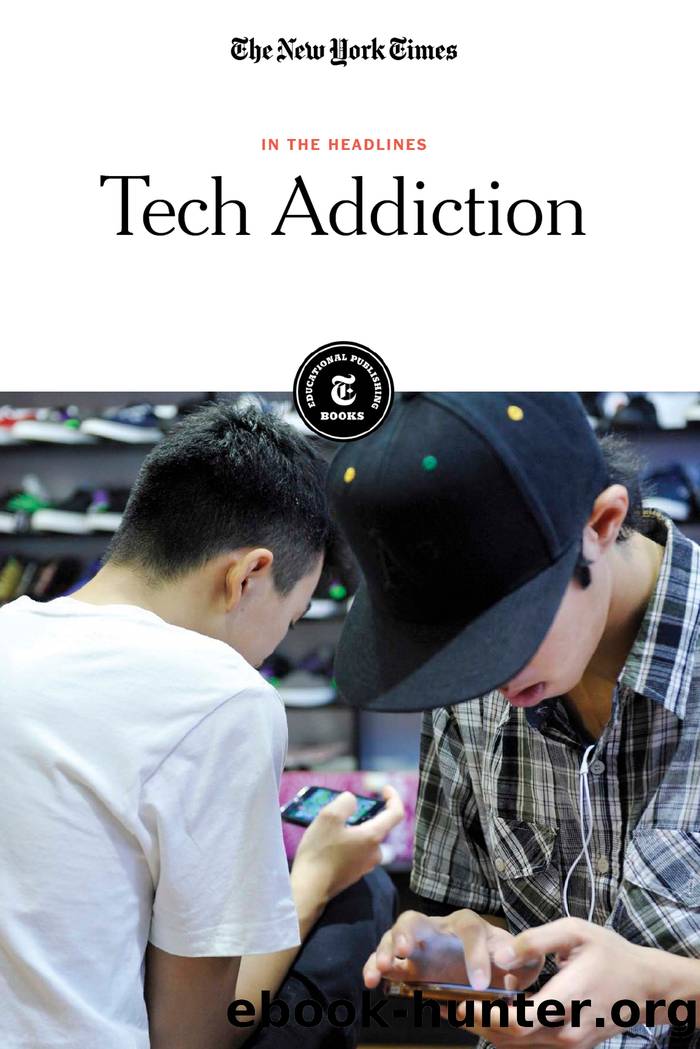Tech Addiction by The New York Times Editorial Staff

Author:The New York Times Editorial Staff
Language: eng
Format: epub
Publisher: The Rosen Publishing Group, Inc
Published: 2019-12-29T00:00:00+00:00
Growing Up Digital, Wired for Distraction
BY MATT RICHTEL | NOV. 21, 2010
REDWOOD CITY, CALIF. â On the eve of a pivotal academic year in Vishal Singhâs life, he faces a stark choice on his bedroom desk: book or computer?
By all rights, Vishal, a bright 17-year-old, should already have finished the book, Kurt Vonnegutâs âCatâs Cradle,â his summer reading assignment. But he has managed 43 pages in two months.
He typically favors Facebook, YouTube and making digital videos. That is the case this August afternoon. Bypassing Vonnegut, he clicks over to YouTube, meaning that tomorrow he will enter his senior year of high school hoping to see an improvement in his grades, but without having completed his only summer homework.
On YouTube, âyou can get a whole story in six minutes,â he explains. âA book takes so long. I prefer the immediate gratification.â
Students have always faced distractions and time-wasters. But computers and cellphones, and the constant stream of stimuli they offer, pose a profound new challenge to focusing and learning.
Researchers say the lure of these technologies, while it affects adults too, is particularly powerful for young people. The risk, they say, is that developing brains can become more easily habituated than adult brains to constantly switching tasks â and less able to sustain attention.
âTheir brains are rewarded not for staying on task but for jumping to the next thing,â said Michael Rich, an associate professor at Harvard Medical School and executive director of the Center on Media and Child Health in Boston. And the effects could linger: âThe worry is weâre raising a generation of kids in front of screens whose brains are going to be wired differently.â
But even as some parents and educators express unease about studentsâ digital diets, they are intensifying efforts to use technology in the classroom, seeing it as a way to connect with students and give them essential skills. Across the country, schools are equipping themselves with computers, Internet access and mobile devices so they can teach on the studentsâ technological territory.
It is a tension on vivid display at Vishalâs school, Woodside High School, on a sprawling campus set against the forested hills of Silicon Valley. Here, as elsewhere, it is not uncommon for students to send hundreds of text messages a day or spend hours playing video games, and virtually everyone is on Facebook.
The principal, David Reilly, 37, a former musician who says he sympathizes when young people feel disenfranchised, is determined to engage these 21st-century students. He has asked teachers to build Web sites to communicate with students, introduced popular classes on using digital tools to record music, secured funding for iPads to teach Mandarin and obtained $3 million in grants for a multimedia center.
He pushed first period back an hour, to 9 a.m., because students were showing up bleary-eyed, at least in part because they were up late on their computers. Unchecked use of digital devices, he says, can create a culture in which students are addicted to the virtual world and lost in it.
âI am trying to take back their attention from their BlackBerrys and video games,â he says.
Download
This site does not store any files on its server. We only index and link to content provided by other sites. Please contact the content providers to delete copyright contents if any and email us, we'll remove relevant links or contents immediately.
Pale Blue Dot by Carl Sagan(5007)
Cracking the GRE Premium Edition with 6 Practice Tests, 2015 (Graduate School Test Preparation) by Princeton Review(4291)
Pocahontas by Joseph Bruchac(4259)
Unfiltered by Lily Collins(4003)
The Emotionary: A Dictionary of Words That Don't Exist for Feelings That Do by Eden Sher(3363)
The Daily Stoic by Holiday Ryan & Hanselman Stephen(3317)
The 48 laws of power by Robert Greene & Joost Elffers(3291)
Factfulness_Ten Reasons We're Wrong About the World_and Why Things Are Better Than You Think by Hans Rosling(3237)
The Innovators: How a Group of Hackers, Geniuses, and Geeks Created the Digital Revolution by Walter Isaacson(3206)
The President Has Been Shot!": The Assassination of John F. Kennedy by Swanson James L(3101)
Sapiens and Homo Deus by Yuval Noah Harari(3071)
Rogue Trader by Leeson Nick(3043)
Gettysburg by Iain C. Martin(2834)
The Rape Of Nanking by Iris Chang(2821)
Almost Adulting by Arden Rose(2709)
The Plant Paradox by Dr. Steven R. Gundry M.D(2620)
In the Woods by Tana French(2598)
500 Must-Know AP Microeconomics/Macroeconomics Questions(2572)
Make by Mike Westerfield(2318)
